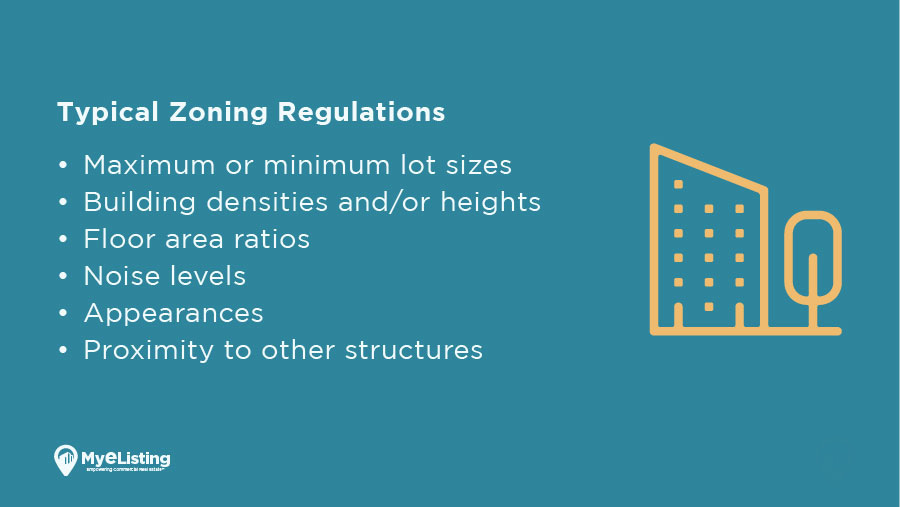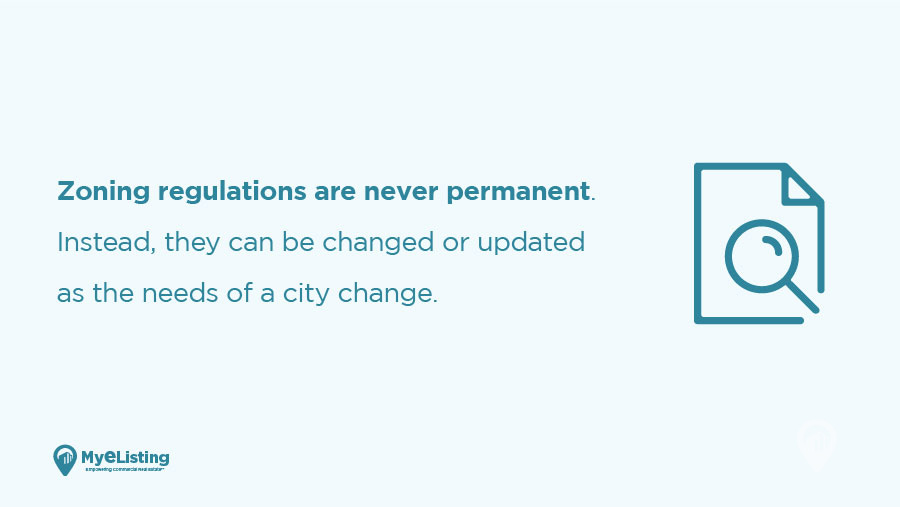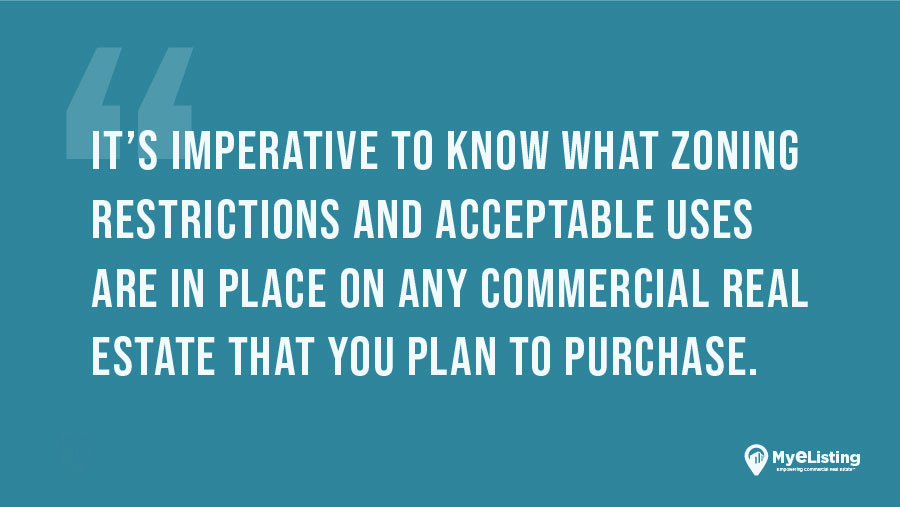The Basics of Zoning in Real Estate

Specializes in providing actionable insights into the commercial real estate space for investors, brokers, lessors, and lessees. He covers quarterly market data reports, investment strategies, how-to guides, and top-down perspectives on market movements.

If you’re considering a land purchase for a particular type of building or want to sharpen your commercial real estate skills, we’ll introduce you to an important topic: zoning in real estate. We’ll also define different types of zoning you may encounter.
In its most basic form, zoning defines what type of building may be constructed in a certain area.
While the two most common types of zoning are commercial and residential, there are several others we’ll discuss.
The History of Zoning
The first zoning laws appeared over 100 years ago when the Equitable Insurance Company built a 42-story building in 1915.
Situated in Manhattan, the Equitable Building contained more office space than any other building in the world. Sounds great, doesn’t it?
It wasn’t great for Equitable Insurance’s neighbors who were living in apartments or running small businesses.
- The new building cast a seven-acre shadow, leaving hundreds of tenants in nearby buildings in permanent shade.
- Similar problems were created by warehouses and factories. Nearby residents found themselves dealing with noise and odors 24 hours a day.
To address these mounting problems, New York created the first-ever zoning ordinance.
It addressed the issue of incompatible neighbors by establishing districts, or zones, where certain businesses or residences were allowed and others prohibited.
While today’s zoning regulations go into more detail (we’ll look at different zoning types next), the basic premise is to ensure that various property types and owners can co-exist.
Different Types of Real Estate Zoning
Each of the following types of zoning helps create and preserve an ideal environment for a city’s residents and business owners.
- Residential;
- Commercial;
- Agricultural;
- Industrial;
- Recreational;
- Historical.
If you’re wondering about that last one, historical zoning, it’s used to preserve older buildings and residences.
It can even preserve an entire neighborhood, such as California’s Bungalow Heaven, a neighborhood of small craftsman homes built from 1900 to 1930.
In addition to defining permitted businesses or residences, zoning may also define lot sizes, noise levels, and even appearances.
Typical Zoning Regulations

When a city government draws up a zoning ordinance, one or more of the following regulations may be included:
- Maximum or minimum lot sizes;
- Building densities and/or heights;
- Floor area ratios;
- Noise levels;
- Appearances;
- Proximity to other structures.
However, a city’s local government may have other goals, which may affect your plans if you’re purchasing commercially-zoned land. Let’s take a look at them.
City Planners and Zoning
Zoning regulations may be created to create a layout that reflects the city planners’ vision of an ideal future for all residents. Examples include:
- Increasing or decreasing housing density in a neighborhood;
- Restricting the amount of construction permitted;
- Encouraging more non-vehicular traffic.
Now that you know why zoning exists, it’s time to look at how it may affect a future business plan or commercial land purchase.
Commercial Zoning Reports
Even if you’re only buying commercial land, any buildings constructed on it require a zoning report.
The content of this report is extremely important, as an incomplete report may limit your future plans and investment income.
Depending on your land’s location and neighboring properties, zoning conditions such as the following may apply:
- Setback and parking requirements;
- Permitted height and floor measurements;
- Descriptions of variances related to any special permits or conditions required.
Last but not least, there may be an eventual zoning dispute, even if you take care to build within your designated conditions.
Let’s look at common disputes and possible solutions.
Common Zoning Disputes
On a basic level, zoning is intended to keep heavy manufacturing away from residential housing. However, it varies by town or city (or to be more specific, the local residents).
Many zoning disputes are between developers of commercial real estate and residents.
For example, residents of the previously-mentioned Bungalow Heaven neighborhood complained when a classic bungalow was demolished and replaced with an apartment complex.
Eventually, city planners ruled in favor of the residents. They “downzoned” the area, limiting residents to three per acre. This eliminated future apartment projects.
However, opposition to commercial zoning isn’t always about preservation. This is why any buyer of commercial real estate needs to look much further than their prospective purchase.
Residential Zoning Nuances
Some larger cities take care to protect certain types of residential housing, especially if housing shortages are a problem.
Understanding these zoning laws is important for any commercial real estate investor, especially when applying for exceptions to the zoning rules.
- For example, limiting residential housing supply has historically played a large role in racial segregation in large metro areas.
- Limiting residential housing may also cause issues with affordable housing codes.
If you determine that your commercial land purchase may run into problems in the long run, you may prefer to look at other land parcels.
However, if you’re convinced that your future plans will improve the lives of a city’s residents, you can ask for an amendment.
Zoning Amendments

Zoning regulations are never permanent. Instead, they can be changed or updated as the needs of a city change.
A zoning law may be amended in its entirety, or exceptions (often called “variances”) can be given.
However, if you’re not experienced in negotiating with city governments, you may want to seek the advice of a seasoned expert, such as a commercial real estate broker or attorney.
Do Your Research and Know Your Zones!

It’s imperative to know what zoning restrictions and acceptable uses are in place on any commercial real estate that you plan to purchase.
If you fail to carry out due diligence regarding zoning laws, you may be unable to build on your property in the future.
Even if your plans are solely to hold the commercial land for future sale, prospective buyers may be planning to develop the property. Restrictive zoning regulations may make it difficult to proceed with a sale.
List & Browse Commercial Real Estate for Free on MyEListing.com!
You can list and browse commercial real estate for free right here on MyEListing.com.
Sign up for a free account for unlimited access to accurate local market intelligence, comp software, demographics reports, and more.
Article Search
Share
All Article Categories








